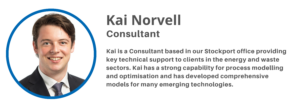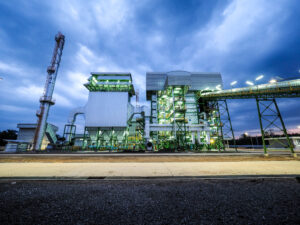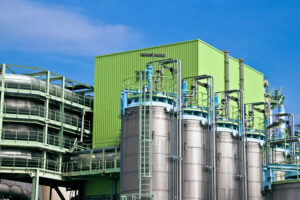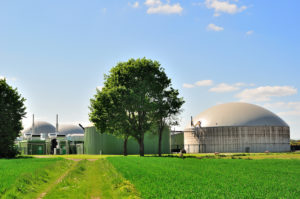Spotlight: Kai Norvell
In our next team spotlight instalment, we are introducing Kai Norvell, a consultant based in our Stockport head office. Kai joined us in 2020 and has since worked on an impressive range of modelling and concept studies covering both emerging and traditional technologies. This valuable input on projects helps our clients to make key decisions on the design and optimisation of energy facilities, find out more about Kai’s project work, career highlights, and inspiration below!
Q: What inspired your career path into engineering?
At school I was good at maths and science; mum was a maths teacher, so being bad at maths wasn’t an option! Plus, I’ve always been keen to understand what makes things work, often tearing apart my BMX and old laptops, and with dad’s encouragement, doing more irresponsible projects like potato cannons and pit bikes.
So, wanting to do something more applied engineering seemed like a good pick. I got an MEng in Chemical Engineering from the University of Manchester, and during my year in industry I was completely sold.
Q: Tell us about what your role involves and the sectors/technologies you focus on?
I mainly work in project development, so feasibility and concept studies where I scope out the designs for new projects. My role is often in modelling the underlying process. When I first joined Fichtner, that meant modelling a lot of steam and boiler cycles for EfW, biomass, and gas plants. As clients expanded into low carbon technologies, I’ve also been modelling newer technologies such as hydrogen, carbon capture, and novel tech like compressed air energy storage and geothermal heat/power.
Q: How does your work contribute to a sustainable future for the UK & Ireland
In the power industry we’re always looking at ways to improve efficiency. This comes with multiple benefits; a more efficient system can create more power, but it also uses less fuel, so it produces less emissions. By modelling these systems I can say for certain what changes should be made to give the best improvements.
I’ve also supported projects in hard to decarbonise areas, like domestic and industrial heating. In these areas we’ve looked at hydrogen as a fuel for steel furnaces and water source heat pumps for a city-wide heat network.
Q: Can you tell us about a particular project highlight during your time at Fichtner?
I developed a design to provide heat to a new district heating network in Rotherham. The network would be supplied by heat that’s currently rejected by the Templeborough Biomass Power Plant. We found a way to access the hot cooling water, then get that water across the River Don and into heat pumps. The heat pumps upgraded the heat to a usable temperature using low carbon power from the power station. The hot water is finally pumped into town to provide heating and hot water to various businesses and houses, which then don’t need to burn gas!
Q: What is the best piece of advice you would give to someone looking to kickstart their career in engineering?
With new solutions for tackling climate change emerging constantly, the work we do is always evolving. So, you need to be keen to learn about new technologies and get stuck in with the challenges they throw you.











